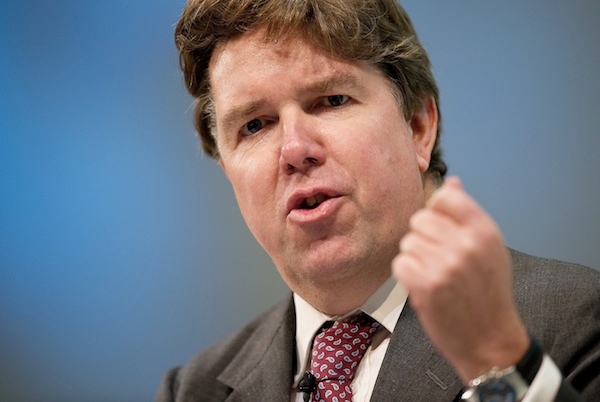So Labour ministers did not ‘lean on’ the Bank of England to encourage lowballing of Libor rates, according to Paul Tucker. The Deputy Governor of the Bank told the Treasury Select Committee this afternoon that he had held conversations with officials about how able Barclays was to fund its operations.
This is the exchange between Pat McFadden and Mr Tucker. McFadden asked whether any minister had tried to ‘lean on’ him over Libor:‘Absolutely not.’
Asked whether Shriti Vadera had leant on him:
‘I don’t think that I spoke to Shriti Vadera throughout this whole process.’
Ed Balls?
‘No’
Other ministers?
‘No’
He confirmed that the ‘senior official’ that he had spoken to was Jeremy Heywood, and added that he also held regular conversations with Tom Scholar at the Treasury, Jon Cunliffe at the Cabinet Office and Nick MacPherson at the Treasury, and said his conversation with Bob Diamond (you can read Diamond’s recollections here) in 2008 actually ran along these lines:
‘The next bit is, and I also said, and this is also recollection, clear recollection that there was nervousness in the bank and I think amongst officials about how firmly based is that decision, have we done the right thing, those circumstances, my phoning up and saying everybody is talking about you.’
He explained why he had called Diamond:
‘The purpose of the call was “people in the market are talking about you, there’s concern about you, just make sure that day-to-day funding operations of your bank don’t take you over the cliff”.’
Tucker later revealed that he had ‘read neither’ the text of George Osborne’s interview with James in last week’s magazine nor the Chancellor’s speech in the House of Commons the following day. It’s worth recalling what the interview actually said:
If exonerating the Bank is his first priority, his second is tying this scandal to the last government. He starts by blaming the regulatory system devised by Brown and Balls for allowing these abuses to happen. But suddenly, and far more explosively, he moves on to the political efforts to keep Libor low during the financial crisis of 2008. ‘As for the role of the Labour government and the people around Gordon Brown — well I think there are questions to be asked of them,’ he says. He starts to discuss reports that those in the Brown circle were pressuring Barclays to manipulate the Libor rate it was paying. Then he drops a bombshell: ‘They were clearly involved and we just haven’t heard the full facts, I don’t think, of who knew what when.’
For Osborne to declare that those around Brown were involved in the efforts to keep Libor down is a remarkable charge, one sure to pour petrol on the political fire raging after it was revealed that ‘senior Whitehall sources’ were behind the pressure on Barclays over Libor. But Osborne doesn’t stop there.
He continues, ‘My opposite number was the City minister for part of this period and Gordon Brown’s right hand man for all of it. So he has questions to answer as well. That’s Ed Balls, by the way.’
This last line is delivered straight into the microphone — a classic Osborne twist of the knife. He knows that this scandal presents a chance to destroy Balls’s reputation, to remind everyone of his role in the failures of the Labour government. One wonders if it is also intended to bring into question Balls’s defence that he couldn’t have known about any rate-fixing as he was Secretary of State for Children at the time.
Osborne did not allege that Labour figures were leaning on the Bank, and he did not say that Ed Balls was personally involved in the Libor scandal. His implication in the Spectator interview is that figures around Brown could have been involved in keeping Libor down by leaning on Barclays, not the Bank. Balls, already angered by the interview, released a statement during this afternoon’s hearing demanding that Osborne withdraw his allegations, which he says ‘were totally false and completely without foundation’. Osborne may simply wish to refer to the interview again and say that Balls is misquoting him, but even the Shadow Chancellor’s enemies will have to conclude that nothing in today’s evidence points to his involvement.







Comments